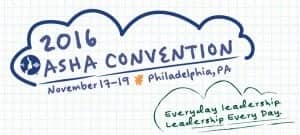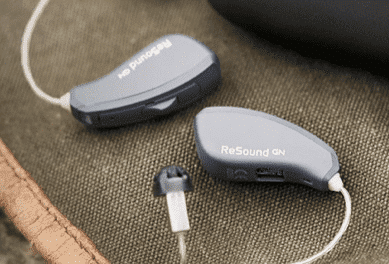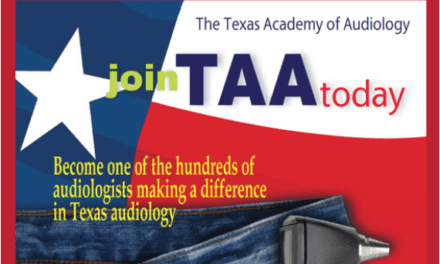
An annual event for audiologists, speech-language pathologists, speech, language, and hearing scientists, audiology and speech-language pathology support personnel, and students, 2016 ASHA will bring together more than 14,000 attendees under the theme, “Everyday leadership. Leadership every day.” The program will feature 6,000 authors contributing their expertise across 24 topic areas.
Among new features at the event are a series of old-fashioned debates on topics that have generated controversy in the professions, including whether a child-directed approach or a clinician-directed approach is better for teaching children with autism to speak; whether clinicians are overmodifying diets in dysphagia patients to manage risk of aspiration and if such decisions are then putting patients at risk for other complications; and the opposing cases for earlier versus later intervention for stuttering. In what is likely to be a lively discussion, panelists will explore different views on the use of PSAPs for affordable treatment of age-related hearing loss, including the evidence comparing outcomes from PSAPs versus those from hearing aids.
Other sessions of interest at ASHA 2016 include:
Toddlers & Technology: Taming the Monster—This workshop will review the recent data on the prevalence of technology in early childhood and will discuss interactions between technology use and child development. The presenters will discuss the controversies regarding limiting screen time and the current status of expert recommendations regarding appropriate use of technology. Experts will discuss effective strategies to encourage healthy social interactions and facilitate language development for all children, including those with disabilities.
Who Framed Babytalk? Seven-Month-Old Infants Benefit From Maternal Repetition—The importance of talking to young children to encourage their language development is well-established, but understanding of specific mechanisms continues to grow. In this study, researchers found that it is constructive for mothers to use repetition in speaking to young children, reusing not only words but also phrases with infants in conversation. This maternal repetition appears to benefit children when they are in the beginning (versus later) stages of learning language. The study yields important information for parents and caregivers about how they can contribute to language enrichment in children as young as 7 months of age.
Stuttering & Labor Market Outcomes: Quantifying the Impact & Accounting for Causes—In the first quantitative study of adult labor market outcomes in the United States for people who stutter, researchers found (a) that those who stutter are more likely to be unemployed than those who do not stutter and (b) that a statistically significant pay gap exists for males. Individuals who stutter are also more likely to have received public assistance. Although some differences may be attributed to education level, the authors propose that workplace discrimination and self-stigma are also contributors to lower wages earned by people who stutter. Authors used longitudinal data of more than 5,000 individuals to look at several nuanced labor market outcomes in reaching their conclusions.
The Influence of Uptalk & Vocal Fry on Perceptions of the Speaker—Much has been made of the vocal qualities of uptalk and especially vocal fry in young women’s voices, but this research uniquely quantifies and compares listener perceptions of uptalk and vocal fry in both male and female voices. The authors found that voices with uptalk and vocal fry were linked to perceptions of lower confidence and lower intelligence and were also considered to be more annoying than a normal voice. This was true in the cases of both male and female listeners. This may have employment and other consequences, and long-term use of vocal fry may also be an unhealthy vocal behavior, authors note.
Verbal & Nonverbal Outcomes of Toddlers With Early Language Delays, Global Developmental Delays & ASD—Building on previous research conducted by the First Words Project—which seeks to improve screening tools and early detection of autism spectrum disorder (ASD) and other communication disorders—this study aimed to characterize early social communication skills of children with and without ASD, as well as children with ASD and co-occurring global developmental delays and/or language delays (both common in those with ASD). The study found notable similarities and differences in the early social communication milestones, such as expression of emotions, use of eye gaze, gestures, and language comprehension, among the six groups included in the study. This collection of skills can be observed and measured months before words emerge and was found to be a strong predictor of later language skills and nonverbal cognitive ability. By improving understanding of social communication milestones in these groups, earlier detection and more targeted interventions may be possible during the toddler years, when the plasticity of the young brain maximizes impact.
Auditory/Vestibular/TBI Micro-Series: Effects of TBI on Auditory Processing, Vestibular Function, and Tinnitus—There has been heightened awareness of the auditory and vestibular side effects of concussion (which can include auditory processing, tinnitus, and vestibular dysfunction) based on current military conflicts as well as increased media attention on sports-related concussions. However, research is still needed (a) to understand the relationships and prevalence of these conditions in people with traumatic brain injury (TBI) and (b) to employ better management strategies for these patients. This session will present new data and offer treatment recommendations for this population.
ASHA is the national professional, scientific, and credentialing association for 186,000 members and affiliates who are audiologists; speech-language pathologists; speech, language, and hearing scientists; audiology and speech-language pathology support personnel; and students. Audiologists specialize in preventing and assessing hearing and balance disorders as well as providing audiologic treatment, including hearing aids. Speech-language pathologists identify, assess, and treat speech and language problems, including swallowing disorders.
Source: ASHA
Image credits: ASHA; © F11photo | Dreamstime.com





